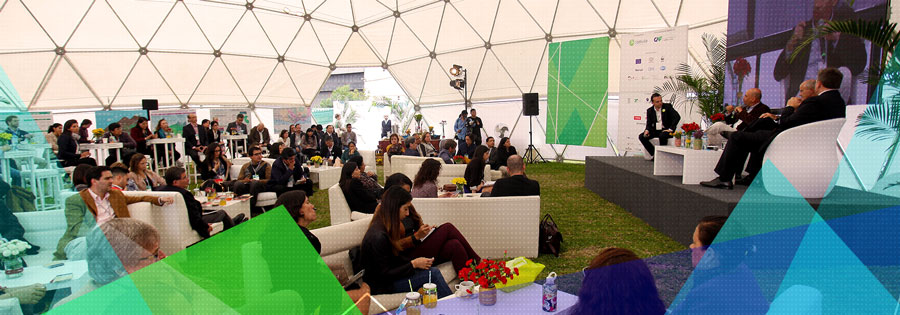nexos+1: "Investing in sustainable businesses boosts competitiveness and innovation".

- nexos+1, the most important sustainability event in Peru, brought together more than 250 businessmen, investors and entrepreneurs who for two days shared new trends in the sustainability market.
- During nexos+1, Sistema B was launched in Peru, a different way of doing business, which seeks a purpose beyond the economic one, and provides solutions to social and environmental problems. In Peru, we already have 6 B companies.
Under the slogan “A window for the business of the future” nexos+1 was held on October 24 and 25 at the Parque del Encuentro. The event brought together more than 250 businessmen, investors and entrepreneurs who, for two days, discussed and exchanged views on new business models that are proving to be profitable while seeking to provide environmental and social solutions to the world. During nexos+1, the role of sustainability in improving the competitiveness of Peruvian companies was highlighted.
nexos+1 was attended by prominent CEOs and managers from Peruvian companies and other Latin American countries, such as Franco Piza, Sustainability Director of Grupo Bancolombia; Jorge Ramos, Executive President of SURA; Jorge López-Dóriga, Communications and Sustainability Manager of Grupo Aje; Catalina Ochoa, General Manager of UBER Peru; Pedro Tarak, Founder of Sistema B Internacional and Marino Morikawa, Peruvian scientist and entrepreneur and creator of the Nano+ system; among others. Also present were prominent personalities such as Mercedes Aráoz, second Vice President of the country; Irene Horejs, Ambassador of the European Union in Peru and María del Carmen Sacasa, UNDP Resident Representative in Peru.
Franco Piza explained that Grupo Bancolombia is one of the most sustainable companies in the world. “Sustainability makes sense and helps to make better decisions. Decisions should guide us to continue generating value, reducing costs, generating income and mitigating risks in the face of environmental problems such as climate change. The decisions you make will shape the future of this country,” he emphasized.
Pedro Tarak pointed out that having a B company and being sustainable today is an option, but in the coming years it will not be possible to do business at the expense of society or the environment. «We are living a new sustainability revolution. In the 2009 crisis, 70% of startups in the US went bankrupt, but more than 83% of B-Companies survived because the market is a partnership, because they are “loved” companies." he indicated.
Mercedes Aráoz, the country's second Vice-President, said that the government wants to make the Peruvian economy more productive, more formal, to incorporate more people and to improve living conditions. She added that “the commitment to the OECD is in force, but we want to go beyond the OECD, make deep reforms to increase the country's productivity, have much clearer rules of the game and comply with sustainability requirements while promoting investment”.
Finally, Irene Horejs, Ambassador of the European Union in Peru, explained that in Europe, investment in sustainable development has boosted innovation, productivity and employment. “The reuse of materials and the reduction of waste has generated savings of 600 billion euros, which represents 8% of the annual turnover of companies,” she said.
The issue of sustainability has to be connected to business
During the second day of nexos+1, one of the central themes was the role of sustainable investments in Peru and Latin America. Representatives from major companies (including 34 CEOs who participated in a breakfast meeting), as well as from the public and banking sectors presented cases of companies that are investing sustainably in Peru, and interesting instruments that are facilitating this type of investment in the region.
In this regard, the executive president of Sura, Jorge Ramos, pointed out that funds that incorporate sustainability are those that perform better and generate better results than those that do not. “When you see that a company begins to incorporate sustainability issues, it is already saying that it is thinking in the long term and those are the companies that will last longer,” he said.
Ligia Castro, Director of Planning at CAF - Development Bank of Latin America, said that by 2030, CAF expects to have 30% of green operations and, by 2050, 50% of the green portfolio.
David Saettone, CEO of Andean Crown and part of the Líderes+1 group, said that, from his company's experience, “promoting sustainable development in the country helps the competitiveness of companies”. María Julia Sáenz, Director of Tax Planning at Backus, pointed out that companies like Backus “know that innovation is the vein of sustainable development”.
At the end, Jorge López-Dóriga of Grupo Aje, pointed out that Latin America can be a leader in how to design companies that protect biodiversity. “Companies are responsible for that biodiversity. It is a competitive advantage for our countries,” he emphasized.
About nexos+1
nexos+1 is an experience designed by the Peruvian company Libélula, specialized in climate change and sustainability.
The 2016 edition of nexos+1 was specially sponsored by CAF - Development Bank of Latin America. It was also sponsored by the European Union in Peru, Toyota, WWF Peru, Backus, GIZ, Peru Innova, COSUDE, Bosques Andinos, IBM and Pfizer. For the development of the event, alliances were created with Sistema B, 7C, Gulliver, Matizart and líderes +1, and with media such as América Economía, Día 1 of El Comercio, Caretas, Stakeholders and Corresponsables.
More information about nexos+1 at: https://nexosmasuno.pe





